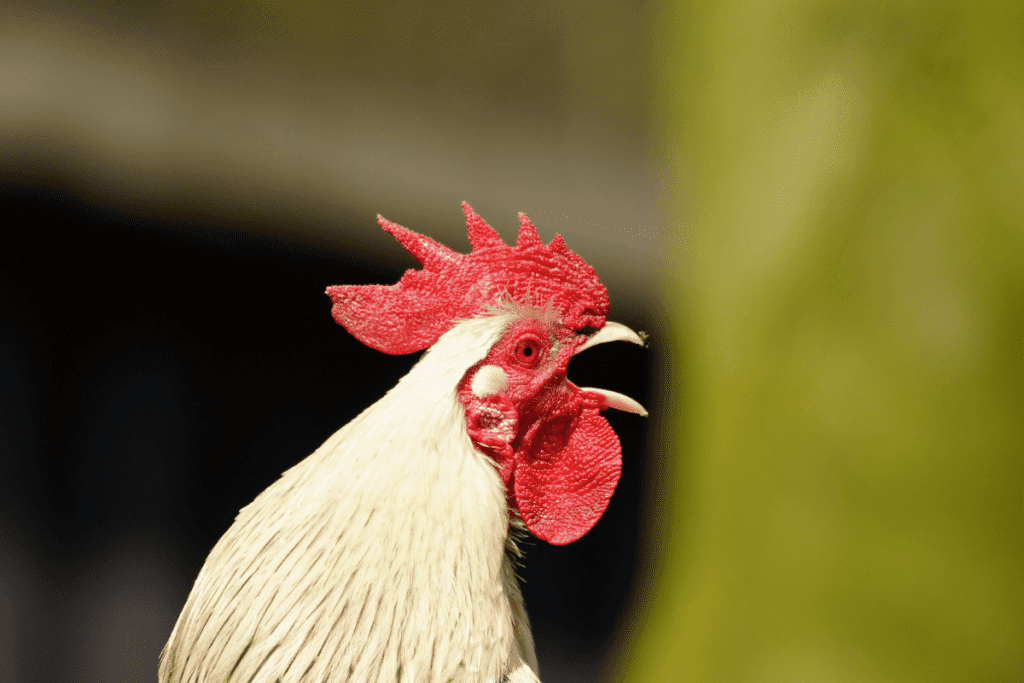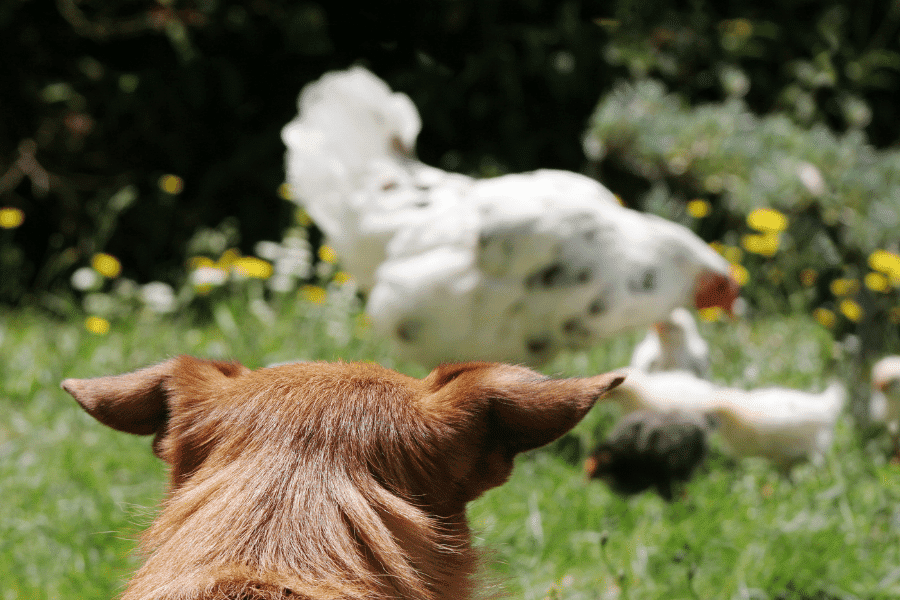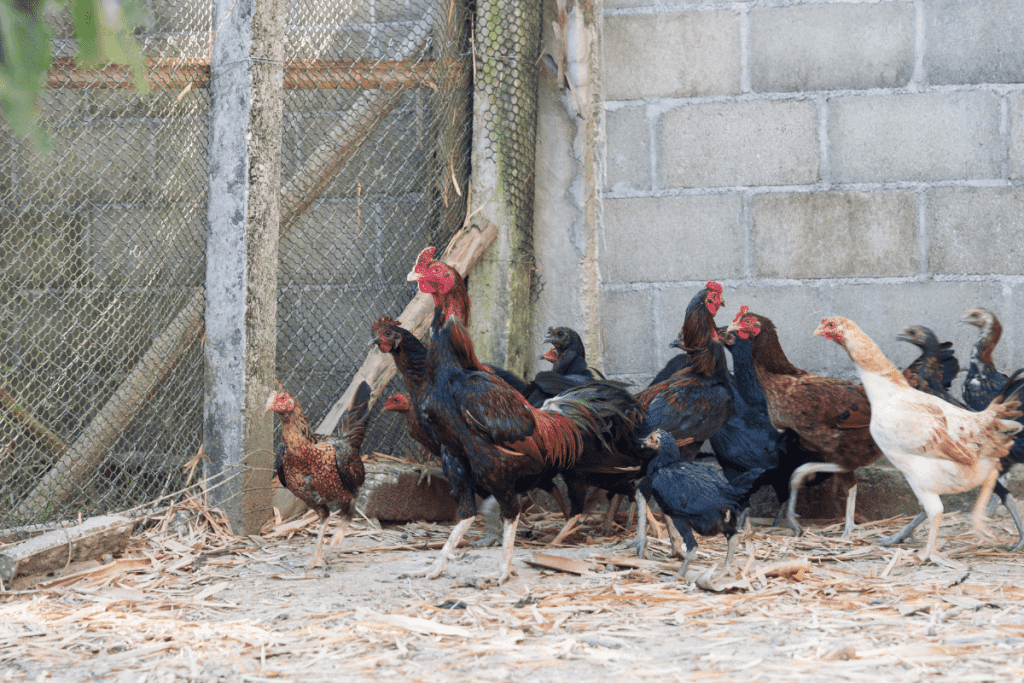If you own chickens, you’ve heard the wide range of chatter, shrieks, growls, and clucks resounding from the hen house.
Do you ever wonder what your chickens are talking about?
There is ample research about communication between chickens, and if you spend time with your flock, you may have started translating on your own.
Are you ready to start understanding your flock better?
Let’s dive into these common chicken sounds and their meanings.

Table of Contents
ToggleEgg Laying Songs
If you keep laying hens, you’re undoubtedly familiar with the cacophony of sounds coming from the chicken coop when an egg is laid.
This is a happy song started by the hen who has laid an egg.
The other laying hens tend to join in for the end of the song, seemingly in celebration and congratulation of the laying hen’s accomplishment.
It is helpful to become familiar with this tune as it indicates your hens are healthy and producing eggs normally.
It also acts as a little reminder to collect eggs.
Chickens are very social creatures, and this is one way they socialize and build relationships with each other in the roost.
The egg-laying songs are one of the most common noises you’ll hear from the flock.
It is characterized as a high-pitched cackle led by the laying hen.
If you walk past the coop and hear their funny little egg-laying song, you’ll be sure to be collecting some eggs later on.
Related: Do chickens have ears and can they hear us?
Grumpy Broody Hens: Hissing And Pecking
Sometimes you’ll have a broody hen in your flock.
It is unpleasant as the broody hen tends to be irritable and aggressive.
You may not think of chickens as creatures who growl, but broody hens make an unmistakable growl when agitated.
They will also hiss and peck at other chickens and people who disturb them during this time.
What Are Broody Hens?
Broody hens lay on their eggs and experience an extreme fluctuation of hormones contributing to an irritable and unpleasant disposition.
The spike in hormones triggers the hen to stop laying additional eggs and attempt to hatch the ones she lays on.
Sometimes the eggs are not fertilized by a rooster making the situation frustrating for you and your broody hen.
Broody hens will only leave their nest once or so a day and tend to fluff their feathers out irritably.
Other chickens in the flock understand her growls and hisses and give her plenty of space while she is out and about.
How To Help Broody Hens
If you have a broody hen laying on an unfertilized egg, you’ll need to break her out of the behavior.
Sometimes hens will brood when there isn’t even a rooster in the flock to mate with.
It’s best to help a broody hen as quickly as possible because it gets harder to break the longer it goes on.
If you get a broody hen without a rooster around, we recommend taking steps to prevent the behavior from happening again.
Sometimes hens become broody from boredom or lack of space.
Providing fibrous vegetables helps to keep hens entertained.
If you want to stop the broody hen’s behavior in its tracks, you’ll need to remove the eggs, so she has nothing to lay on.
Wear thick gloves when doing this as your broody hen will not appreciate this.
Air Raid Warning: Shrill Shriek
One of the most important reasons to learn common chicken sounds and noises is the ability to tell when your flock is in danger.
If you learn no other chicken sounds, learn the air raid warning.
It is a shrill scream or shriek alerting the rest of the flock of the presence of imminent danger.
Chickens often make this noise when an aerial predator like a hawk flying overhead.
They also make this sound if a ground predator like a raccoon or possum has successfully snuck up close to the flock without any chickens noticing.
If you hear your chickens scream or shriek, go out and check on them.
Predators are significantly less likely to attack if there is a human present.
In some areas, hawks are a huge threat to chickens.
They attack by diving in from overhead and catch chickens quickly with little warning.
If you find hawks becoming a significant threat to your flock, we recommend installing overhead wire where the chickens roam the coop.
Only let the chickens roam free when you or another human being present.
The hawk is significantly less likely to attack the chickens when you or another person is with the flock.
Predator Warning: Fast And Loud Clucking

The predator warning is similar to an air raid shriek but differs in its alarm level.
Predator warnings start as a repetitive clucking to let the flock know to be on guard as a threat is present.
The chickens begin to cluck faster and louder as the threat approaches.
This repetitive clucking acts as an early warning sound among the flock to flee from the threat.
The predator warning and air raid warning are incredibly important to learn.
It will help keep your chickens safe from predators and keep you from losing chickens.
Many predators creep up on chickens and are responsible for many deaths in flocks.
Common predators include:
- Raccoons
- Possums
- Hawks
- Cats
It is very hard to keep potential predators away in certain areas, which is why it is beneficial to know the warning cries from your flock.
Nesting Spots: Repetitive Clucking
Some chickens are very particular about where they will lay their eggs.
Sometimes hens become territorial of their nesting spot, and they are not afraid to show it.
If a hen finds her favorite nesting spot occupied, she will strut back and forth around the spot, clucking in an attempt to force the other hen to leave.
The repetitive clucking is an intimidation tactic.
If this doesn’t work, some particularly stubborn hens attempt to climb into the nesting spot and physically push the residing hen out.
If this becomes a continuous problem, we recommend adding more nesting boxes to give the laying hens more options.
Sometimes the rooster will take it upon himself to find nesting spots for particular hens.
He will evict laying hens from the spots and offer it to a specific hen.
It tends to cause a little chaos in the coop, but they end up sorting it out among themselves.
Safe And Content Murmuring
The safe and content murmuring of a flock of chickens is music to our ears.
You’ve undoubtedly heard this chatter while the flock happily roams and pecks at the ground.
This sound indicates your chickens feel safe and content.
It also helps the rest of the flock feel safe and know it is okay to let their guard down and enjoy their time.
If you work on socializing your chickens through frequent pets, you’ll hear them murmur and even purr in contentment while seated on your lap.
It is a fantastic sound indicating the chickens enjoy themselves and feel secure.
Often you’ll hear the soft, content murmuring in the mornings and evenings.
Chickens tend to be more lively and energetic with their chatter in the mornings as they wake up.
In the evening, their chatter generally feels more subdued and sleepy as they get ready to rest for the night.
Clucking From Mother Hens
If you have chick-laying hens, you’ve likely heard them chattering with their eggs.
While this is an endearing behavior, there is a good evolutionary reason.
The chickens begin to learn their mother’s voice and associate it with safety by talking to the eggs before they hatch.
This helps the mother communicate with the chicks once they hatch.
Towards the end of incubation, you’ll likely hear more chatter coming from the mother hens and even the baby chicks.
If you listen closely, you’ll hear the unhatched chicks chirping back from inside the egg.
This is the mother hen’s way of encouraging the baby chicks to hatch.
Once the chicks hatch, they’ll recognize their mother’s voice and know they are safe.
Mother hens will cluck and let chicks know when food is safe to eat.
They will also cluck in to let chicks know when to come back to her and the nest.
Establishing communication with the chicks ensures their safety.
If a chick seems to be having a hard time catching on to the mother hen’s instructions, she will slow her clucks down to give the baby chick a better chance of understanding her.
Rooster Roll Call
If you have a rooster, you may have noticed the way they call the hens into the coop once evening comes.
The head rooster often stands at the coop and calls the rest of the chickens in for the evening to make sure they are all accounted for.
It is a way for the rooster to ensure all the hens are safe and inside for the evening.
In general, chickens are social creatures with hierarchies.
Sometimes chicken keepers will count the chickens themselves, and the rooster will skip this duty.
Roosters will also circle the coop until all the hens are safe and sound inside.
The rooster roll call is loud and repetitive. It also tends to be lower-pitched.
Many people think chickens do not feel bonds, but growing evidence suggests they do.
By listening to the chatter and clucks of our flock, we’ll begin to see their unique personalities and bonds.
Crowing

We’ve all heard the iconic crow of a rooster at some point in our life.
The cock-a-doodle-doo is a trademark of the rooster.
Did you know some hens will also crow?
Usually, this is due to a hormone imbalance, but sometimes the head hen will crow if there is no rooster present.
Chickens will crow for a variety of reasons.
Roosters crow in the morning to indicate it is time to wake up and look for food.
If you have multiple roosters, crowing is done in the order dictated by the pecking order.
No other roosters will crow until the dominant rooster has let out his first cock-a-doodle-doo.
The rooster’s crow is based on his circadian rhythm.
This is why we associate the rooster’s crow with the break of day.
Once the rooster wakes up, it lets out its crow to let the rest of the flock know he is up and ready to find food.
Call From Lonely Hens
Sometimes one hen will lose her way from the rest of the flock.
Chickens are incredibly social and like to do all their activities together.
If the hens are out grazing and peaking around for insects, they’ll feel lonely if they look up and don’t see the rest of the flock.
The lonely hen will call loudly and incessantly until the rooster or head hen comes to bring them back to the rest of the flock.
You likely won’t hear this call too often, but it is a good idea to check on the lonely hen.
Solitary hens are an easy pick for predators, so we recommend ensuring your flock consistently takes advantage of safety in numbers.
Food Call
Roosters tend to be the primary foragers of the flock.
They will go out and search for food and alert the rest of the flock once a tasty treat is found.
Many roosters will only eat after all the hens have had their fill.
When there is no rooster present, the head hen at the top of the pecking order may take this role upon herself.
However, any chicken who finds food may let out the food call.
The food call noise tends to be a repetitive, dull click to summon the rest of the flock.
Because chickens are very social, they’ll want to share their find with the rest of their flock.
Many chicken keepers tend to only notice these sounds from their flock when a particularly special morsel like mealworms is discovered.
Related: Feeding chickens mealworms
Because of this, many people associate this sound with pleasure rather than eating.
Most chickens won’t make the food call for their usual feeder.
Chick Chirps
If you’ve recently welcomed some new chick additions, you’ve probably already started to hear their chatterings like clucks and beeps.
When the mother hen is around, she’ll take care of the chicks’ needs, but you’ll need to pay special attention if you are raising chicks without the mother.
This way, you will be able to tell when your chicks are in need or threatened.
Happy Chick Sounds
If you’ve raised chicks, you’re familiar with the soft little chirps and peeps of happy little chicks.
Often you’ll hear this when the chicks are nuzzled in together under the warmth of the heat lamp in their coop.
You’ll also hear this while pecking around at their food or following their mother hen.
Scared Chick Sounds
The sounds of a scared chick are ones to look out for if you are raising them without the mother present.
These chicks are relying on you for safety, warmth, and food.
They will let you know when they need something, so it’s beneficial to understand what they may be asking for.
- Hungry and cold chicks will let out an incessant high-pitched chirp. It sounds unhappy. If you hear this, check in on them to ensure they have food, water, and warmth.
- Panicking chicks let out a resounding, high-pitched, and repetitive chirp. It unmistakably sounds like the chick is panicking and should be checked in on.
- When a chick is scared, it will let out little peeps and visibly look uncomfortable. Often it wants to be back with its mother or other chicks. Rejoining the chick with the other babies and/or mothers will get them to quiet down.
Why You Should Talk To Your Chickens

Chickens are known for their constant chatter, clucks, and chirps.
We may tune it out as background noise, but they communicate with each other, and we should listen too.
Understanding your chickens allows you to foster the safest and happiest place possible for your chickens.
They let you know when they are in danger or need additional food, warmth, nesting spots, or care.
It’s amazing when you think about it.
While we don’t expect to know everything our chickens talk about, familiarizing ourselves with common sounds and noises will get us well on our way towards happier chickens.
Spending time with your chickens is a great way to socialize them and get a better understanding of each of your chickens.
If you are new to keeping chickens, you may not realize how big their personalities are or how important it is to understand common chicken noises.
Each one is unique. I have had a wide range of personalities in my coop.
Sometimes chickens are docile, sweet, and love pets and human socialization.
Others are sassy, assertive, and quick to tell you when things aren’t up to their standards.
Whatever their personality, it is important to get a general idea of what they are saying when they are clucking and murmuring about.
Importance Of Vocal Chickens
Most chicken keepers love to listen to the sounds of their flocks.
Understanding the common noises and sounds helps us feel closer to our flock and better care for them.
For the most part, we do not want quiet chickens.
Quiet chickens are more susceptible to predators.
We’d also have a lot more trouble making them happy if we cannot tell when they feel content and safe.
We recommend regularly sitting with your flock to listen to their chatter and assess how they are doing.
This helps build a bond between you and your flock and helps your chickens feel cared for and safe.
It is also quite fun to learn the different personalities of each chicken.
Each tends to have its likes and dislikes.
I particularly love to see the personalities bloom as they grow.
The pecking order often indicates who will be the loudest.
Those chickens lower in the pecking order tend to be on the quieter side.
The quiet chickens are especially important to spend time with and listen to.
Their queues are likely more subtle than the loud chickens in the higher ranks.
What To Do When A Chicken Goes Quiet
Sometimes chickens go quiet when they are in distress or depressed.
Yes, chickens do suffer from depression from time to time.
Often chickens feel depressed when they lose a coop mate they were particularly bonded to or if they suffer a trauma.
Close encounters with predators are a common reason chickens feel traumatized and may go quiet.
Injured chickens also tend to act much quieter than usual.
If you notice sudden behavioral changes in any of your chickens, we recommend checking them out to ensure they do not have any injuries or obvious reasons for their distress.
Quiet Chicken Breeds
Sometimes you may need quieter chickens.
This is a common problem for keeping chickens in urban areas with close neighbors.
We may love the sounds of our chickens murmuring happily about, but our neighbors may not appreciate noisy chickens.
Generally speaking, there is no such thing as a silent chicken, but there are some breeds with tendencies to be a little less chatty.
The following breeds of chickens tend to be quieter than others:
- Brahmas
- Silkies
- Australorps
- Javas
- Rhode Island Reds
If you are actively seeking a quieter flock, we recommend avoiding some more vocal varieties.
The following breeds of chickens are known for their spunky, loud vocalizations:
- Araucana
- Easter Eggers
- Polish
- Welsummers
How useful was this post?
Click on a star to rate it!
We are sorry that this post was not useful for you!
Let us improve this post!
Tell us how we can improve this post?
